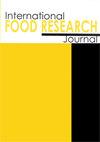Quality assessment of promising garlic (Allium sativum L.) varieties based on principal component analysis
IF 1
4区 农林科学
Q4 FOOD SCIENCE & TECHNOLOGY
引用次数: 0
Abstract
Physicochemical properties, pungency, anti-nutritional factors, cutting strength, and colour attributes of seven promising garlic varieties were assessed for their potential application. The garlic varieties were found to be slightly acidic (pH 6.08 - 6.77), and contained varying amounts of crude protein, carbohydrate, crude fat, ash, crude fibre, acidity, and total soluble solids (TSS). The pungency factor as pyruvic acid was found to be in the range of 34.84 - 86.69 μmol/mL, whereas anti-nutritional factors such as saponin (6.63 - 13.98 g), phytic acid (0.03 - 0.6 g), and tannin (0.18 - 0.39 gCE) per 100 g on a fresh weight basis were present. The Bhima purple (BP) variety with a purple tinge showed higher saponin content than the other varieties with a whitish tinge. The cutting strength of garlic cloves varied between 17.20 and 104.61 N. Physical and gravimetric properties were estimated and found to be variety-dependent (p ≤ 0.05). Colour attributes like L* (lightness), a* (redness), b* (yellowness), chroma, hue, and browning index were significantly different (p ≤ 0.05) for all the garlic varieties. The minimum hue value, and maximum a* and b* values, browning index (BI), and chroma were found in the BP variety. Principal component analysis as a significant multivariate analysis tool was applied to assess the existence of correlation among the estimated parameters. It was found to be 75.41% of the total variance when considering the first three principals. Haryana garlic-17 (HG-17) variety showed significant quality as it yielded positive correlation with the maximum number of quality attributes.基于主成分分析的有前途大蒜(Allium sativum L.)品种的质量评估
评估了七个有潜力的大蒜品种的理化特性、辛辣度、抗营养因子、切割强度和颜色属性,以确定其潜在的应用价值。结果发现,这些大蒜品种呈微酸性(pH 值为 6.08 - 6.77),含有不同数量的粗蛋白、碳水化合物、粗脂肪、灰分、粗纤维、酸度和总可溶性固形物(TSS)。辛辣系数(丙酮酸)的范围为 34.84 - 86.69 μmol/mL,而抗营养系数(皂苷)(6.63 - 13.98 g)、植酸(0.03 - 0.6 g)和单宁(0.18 - 0.39 gCE)(以鲜重为基础)则为每 100 g。紫红色的比马紫(BP)品种的皂苷含量高于其他带白色的品种。蒜瓣的切割力介于 17.20 和 104.61 牛顿之间,物理和重量特性经估算后发现与品种有关(p ≤ 0.05)。所有大蒜品种的颜色属性,如 L*(亮度)、a*(红度)、b*(黄度)、色度、色调和褐变指数都有显著差异(p ≤ 0.05)。BP 品种的色调值最小,a*和 b*值、褐变指数(BI)和色度最大。主成分分析是一种重要的多元分析工具,用于评估估计参数之间是否存在相关性。在考虑前三个主成分时,发现其占总方差的 75.41%。哈里亚纳大蒜-17(HG-17)品种显示出显著的品质,因为它与最多的品质属性呈正相关。
本文章由计算机程序翻译,如有差异,请以英文原文为准。
求助全文
约1分钟内获得全文
求助全文
来源期刊

international food research journal
Agricultural and Biological Sciences-Food Science
CiteScore
1.40
自引率
0.00%
发文量
75
期刊介绍:
The International Food Research Journal (IFRJ) publishes papers in English, six (6) issues a year with the coverage of:
Food Science and Technology
Nutrition and Dietetics
Agriculture, multidisciplinary
Chemistry, multidisciplinary
The scope of the Journal includes:
Food Science, Food Technology and Food Biotechnology
Product Development and Sensory Evaluation
Food Habits, Nutrition, and Health
Food Safety and Quality
Food Chemistry, Food Microbiology, Food Analysis and Testing
Food Engineering
Food Packaging
Food Waste Management
Food Entrepreneur
Food Regulatory
Post-Harvest Food Management
Food Supply Chain Management
Halal Food and Management
 求助内容:
求助内容: 应助结果提醒方式:
应助结果提醒方式:


